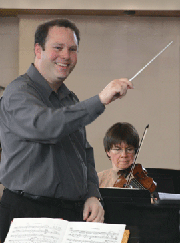
|
|
Yariv Aloni
in rehearsal |
Phillip T Young Recital Hall
January 17, 2007

|
|
Yariv Aloni
in rehearsal |
It is well-known that the entire published oeuvre of Anton Webern, if played consecutively, would last for less than three hours.
What is rather less well-known is that Webern composed an equal, or perhaps greater amount of music that was never published and often not performed during his lifetime - his early orchestral piece, Im Sommerwind, for example, was premiered at the 1962 Seattle World's Fair, some seventeen years after its composer's death.
Unusually, much of this unpublished music was written during Webern's maturity. The Langsamer satz of 1905 is one of the exceptions, although one could hardly describe this polished and accomplished work of a 22-year-old as "juvenilia".
On the other hand, it is far from being the "real" Webern, inhabiting the same Late Romantic sound world as Schoenberg's Verklärte Nacht and it received a truly lush performance at the hands of Yariv Aloni and the Galiano Ensemble on Wednesday - Webern for people who prefer Brahms, one might say.
Paul Hindemith was a viola player and while the instrument hardly dominated his Five Pieces, Op.44, the passages for violas revealed a distinct and uncommon sympathy with this misunderstood instrument.
Although the pieces were written for young musicians - the movements have a wonderful straightforwardness to their titles: "slow", "lively", "very slow" etc. - they have a depth that belies their original purpose.
Aloni and his players gave this unfamiliar work a reading which captured the music's many moods perfectly, from the somewhat sombre opening to the decidedly jolly finale, with its neoclassical edge.
Of Wednesday's four composers, Giovanni Sollima is the only one who is still living (he was born as recently as 1962).
Sollima's Violoncelles, Vibrez! is subtitled "Ballade for two cellos and strings", which hardly begins to describe the fireworks which begin as soon as the soloists start to play.
I have to say that the accompaniment, beautifully played although it was, was little more than a series of partially-digested minimalist clichés. The work was redeemed - and how! - by the solo parts, of a truly fearsome level of technical difficulty.
Whether they were exploring the upper reaches of their instruments' range or dizzying the audience with rapid-fire passagework, Pamela Highbaugh Aloni and Paul Kiffner were ideal soloists, putting not a foot (nor, indeed, a finger) wrong. Extraordinary.
George Enescu spent much of his working life in Paris, during which time he adopted the French form of his name (Georges Enesco) by which he is often known.
As well as composing - which he felt to be his true vocation - Enescu was a conductor, virtuoso violinist and teacher (Menuhin was a pupil). He also had one of the most formidable musical memories in history, performing almost all of his vast repertoire - from Bach to his own works - from memory. He could also play at the piano or conduct from memory Wagner's entire output and the major masterpieces of Bach, Beethoven and Brahms.
Enescu's Octet for strings was composed in 1900, when he was nineteen; the composer himself apparently expressed a desire to hear it performed by a chamber orchestra and I imagine he would have been delighted with Wednesday's performance.
Although, stylistically, Enescu was still finding his feet in this work, there were still several passages where pointers to his mature manner could be discerned.
The performance itself was such as virtually to silence all criticisms, from the unison opening (not the world's most distinguished theme, it must be said), via the fiery second movement, the quite lovely slow movement to the waltz-time finale's tumultuous close. String tone was, as throughout the evening, luscious and resonant, and the ensemble matched Aloni's rubato perfectly.
Furthermore, although scaling up chamber music often leaves the listener vaguely dissatisfied, this was an exception. The division of the music between solo instruments and the full group was exquisitely done (by whom? the programme did not say).
A marvellous end to a wonderful evening's music-making.
 MiV Home
MiV HomeLast modified: Mon Jan 22 21:34:46 PST 2007